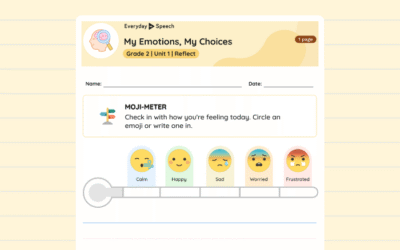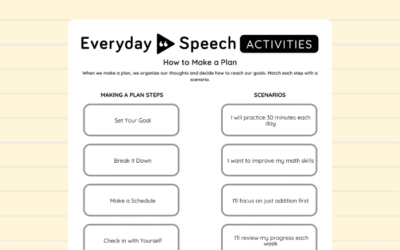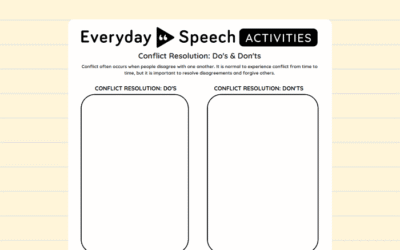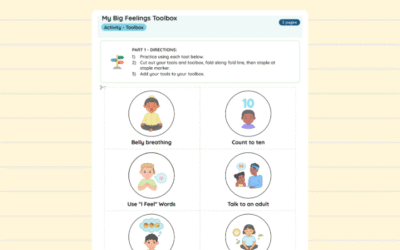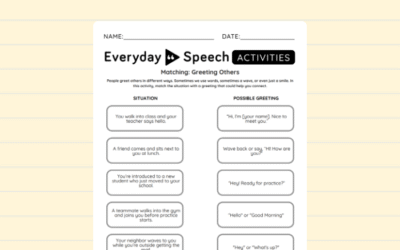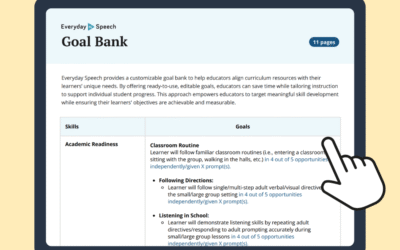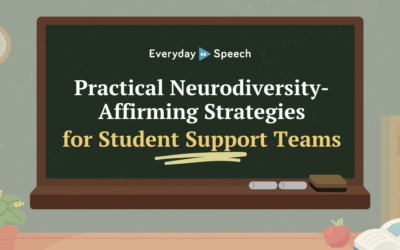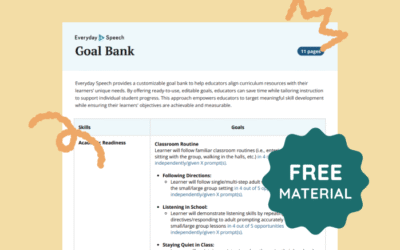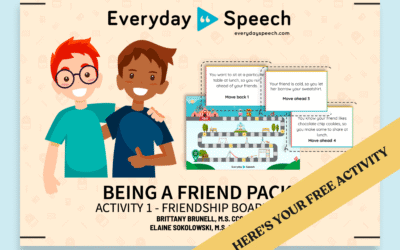Everyday Speech Blog
Social Skill Lesson Plans and Articles
75+ Social Skills Interventions to Support Every Learner
100+ No-Prep Social Skills Lessons
60+ Social Skills Worksheets for Kids (Printable and Ready to Use)
20+ Social Skills Activities for Preschoolers
150+ Social Skills Activities for Kids (Printable & Fun)
IEP Goal Bank
Practical Neurodiversity-Affirming Strategies for Student Support Teams
How AI Can Lighten Your Caseload Without Losing the Human Touch
Caseloads are heavy. Between direct services, progress monitoring, documentation, and family communication, it can feel like there is not enough time left for the actual instruction. Expectations are also rising. Teams want more differentiation, greater consistency,...
22 Free Friendship Skills Activities for PK–12 Students
Friendship skills help students build meaningful peer relationships, navigate social situations, and feel a sense of belonging at school. Some students develop these skills naturally, while others need explicit instruction and repeated practice to build confidence and...
No-Prep Activities
Teaching PreK Students to Manage Stress with Deep Breathing Techniques
Introduction In today's fast-paced world, even young children can experience stress and anxiety. As educators, we can help them develop healthy coping strategies to manage these emotions. One such technique is deep breathing, which can be easily incorporated into the...
Empowering Independence: Fostering Self-Reliance in Special Education Students
Introduction Gaining independence is a crucial aspect of personal growth that positively impacts self-esteem, confidence, and opportunities for learning. As students grow up, they increasingly rely less on others and take the initiative to do things on their own. For...
Calming Strategies for Students in Special Education: Activities and Discussion Questions
Introduction Social-Emotional Learning (SEL) is an essential aspect of education, especially for students in special education. Teaching calming strategies and self-regulation techniques can help students better manage their emotions and behavior. In this blog post,...
Teaching the Skill of Asking a Friend to Play: Activities and Discussion Questions
In this blog post, we will explore the essential skill of asking a friend to play, which is a crucial aspect of Social-Emotional Learning. We will provide you with a no-prep activity, discussion questions, related skills, and next steps to help educators teach this...
Taking Responsibility: A Key Skill for Social-Emotional Learning
Introduction Taking responsibility is a crucial aspect of Social-Emotional Learning (SEL). It means being accountable for our actions, acknowledging our mistakes, and trying to fix them. When students take responsibility, they understand that their choices are their...
Teaching Good Hygiene Practices: A Guide for Educators
Good hygiene is essential for maintaining our health and ensuring that we have positive social interactions. As educators, it's important to promote good hygiene habits among students, so they can develop lifelong routines that keep them healthy and make others feel...
Teaching Kindergarteners Effective Handwashing Techniques and Related Social-Emotional Skills
Introduction Handwashing is an essential skill that everyone should learn from an early age. For kindergarten students, it is important to teach them not only the mechanics of handwashing but also the underlying principles of hygiene and self-care. In this blog post,...
Teaching Students the Art of Compromise: A Guide for Educators
Introduction As educators, we understand that disagreements are a natural part of human interaction. One of the most valuable skills we can teach our students is the art of compromise. Compromising is a way to find common ground and resolve conflicts while maintaining...
Act It Out! Empathy Role-Playing Game for Elementary Students
Introduction Welcome to Act It Out!, a role-playing game designed to help elementary students develop empathy and understand the feelings of others. Empathy is a vital skill in social-emotional learning, allowing students to relate to one another's emotions and...
Teaching Kindergarten Students to Keep Calm and Follow the Group
Introduction As educators, we understand the importance of teaching our students how to adapt to different situations and handle their emotions in a healthy way. Social-Emotional Learning (SEL) plays a crucial role in developing these skills. One vital skill for...
Teaching Students to Get Attention Respectfully: Activities and Discussions
Introduction One essential skill for students to learn is how to get someone's attention in a respectful and polite way. This is a vital aspect of social-emotional learning, as it fosters positive interactions and relationships among peers and educators. In this blog...
Teaching High School Students to Drive Conversations Forward
Introduction Conversations are an essential part of everyday life, and engaging in meaningful conversations is a crucial skill for high school students to develop. In this blog post, we will discuss how to teach students to drive or keep a conversation going by asking...
Teaching Indirect Communication Skills to Address Mistakes Respectfully
Introduction Everyone makes mistakes, including adults like parents and teachers. It's important for students to learn how to correct someone without being disrespectful or hurting their feelings. This blog post focuses on teaching middle school students the...
Enhancing Connected Play and Social-Emotional Learning in PreK Classrooms
Introduction Connected play is an essential skill for young students to develop strong social-emotional learning foundations. When children learn to connect their play with others, they enhance their communication, cooperation, and empathy skills. This blog post will...
Teaching Effective Communication with the Conversation Stoplight
Introduction Educators working with elementary students often face the challenge of teaching effective communication skills. One effective method to help students develop these skills is the Conversation Stoplight. This concept helps students understand when to start...
